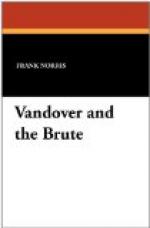Through the numbness and giddiness that gradually came into his head like a poisonous murk he saw one thing clearly: It was gone—his art was gone, the one thing that could save him. That, too, like all the other good things of his life, he had destroyed. At some time during those years of debauchery it had died, that subtle, elusive something, delicate as a flower; he had ruined it. Little by little it had exhaled away, wilting in the air of unrestrained debauches, perishing in the warm musk-laden atmosphere of disreputable houses, defiled by the breath of abandoned women, trampled into the spilt wine-lees of the Imperial, dragged all fouled and polluted through the lowest mire of the great city’s vice.
For a moment Vandover felt as though he was losing his hold upon his reason; the return of the hysteria shook him like a dry, light leaf. He suddenly had a sensation that the room was too small to hold him; he ran, almost reeled, to the open window, drawing his breath deep and fast, inhaling the cool night air, rolling his eyes wildly.
It was night. He looked out into a vast blue-gray space sown with points of light, winking lamps, and steady slow-burning stars. Below him was the sleeping city. All the lesser staccato noises of the day had long since died to silence; there only remained that prolonged and sullen diapason, coming from all quarters at once. It was like the breathing of some infinitely great monster, alive and palpitating, the sistole and diastole of some gigantic heart. The whole existence of the great slumbering city passed upward there before him through the still night air in one long wave of sound.
It was Life, the murmur of the great, mysterious force that spun the wheels of Nature and that sent it onward like some enormous engine, resistless, relentless; an engine that sped straight forward, driving before it the infinite herd of humanity, driving it on at breathless speed through all eternity, driving it no one knew whither, crushing out inexorably all those who lagged behind the herd and who fell from exhaustion, grinding them to dust beneath its myriad iron wheels, riding over them, still driving on the herd that yet remained, driving it recklessly, blindly on and on toward some far-distant goal, some vague unknown end, some mysterious, fearful bourne forever hidden in thick darkness.
Chapter Fifteen
About a week later Hiram Wade, Ida’s father, brought suit against Vandover to recover twenty-five thousand dollars, claiming that his daughter had killed herself because she had been ruined by him and that he alone was responsible for her suicide.
Vandover had passed this week in an agony of grief over the loss of his art, a grief that seemed even sharper than that which he had felt over the death of his father. For this last calamity was like the death of a child of his, some dear, sweet child, that might have been his companion throughout all his life. At times it seemed to him impossible that his art should fail him in this manner, and again and again he would put himself at his easel, only to experience afresh the return of the numbness in his brain, the impotency of his fingers.




